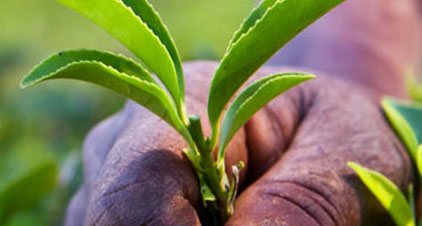ETG partners with eco.business Fund on agricultural sustainability project in Kenya
Nairobi, Kenya: ETG is launching a data driven agricultural intensification pilot project in Kenya, in collaboration with the eco.business Fund and its adviser, Finance in Motion, a leading global impact asset manager that focusses exclusively on development finance. The eco.business Fund provides financing and technical assistance to businesses that demonstrate a commitment to sustainability and environmental conservation in Sub-Saharan Africa, Latin America and the Caribbean. ETG has been selected to partner with the Fund in one of its four key economic sectors, i.e. agriculture and agri-processing, and is involving the ETG Farmers Foundation for backstopping support and the farmer capacity building component of the project.
The intervention is facilitated in Kenya by EIHL, ETG’s Agri inputs division. The main goal is to improve farmer productivity whilst enhancing the environmental risk management and climate resilience of ETG Kenya’s maize, coffee and tea supply chains through improved soil and crop nutrition management. Using a combination of drone technology, data analytics and soil sampling, 60 selected farmers representing, the three value chains in different parts of the country, are provided with diagnostics, training, and demonstration input packages in order to improve their productivity.
Expected outcomes include a comprehensive assessment of the challenges facing the production of maize, coffee and tea; increased capacity of lead farmers to manage the production of maize, coffee and tea; increased use of soil and crop nutrients by maize, coffee and tea farmers through an efficient input distribution system; and knowledgeable farmers that are conversant with the usage of nutrition plans and crop calendars for continuous monitoring and analysis. Together, these outcomes are predicted to contribute to the improved livelihoods of independent farmers and boost their earnings.
It is anticipated that the project will result in significant commercial benefit for the Group, and especially the inputs vertical, as the crop and soil data collected can be used in the development of crop nutrition needs and location specific soil profiles. While crop profiles and calendars can be deployed by sales agronomists to inform agro-dealers and farmers about timely and appropriate input application, soil profiles are important tools to define nutritional deficiencies and provide information for the manufacture of customized blended fertilizers. Beyond the immediate profitability aspect, the project is expected to build ETG’s long-term linkages with farmers and agro dealers, while expanding its footprint in the domestic tea and coffee value chains.
The project is aligned with crop calendars and harvesting schedules, and a kick-off workshop is planned at the end of March with all stakeholders, including the technological service provider who is currently being contracted. The success of this project will determine how it can be scaled up to reach more farmers and its replicability across different geographic locations. With the country team in Kenya enthusiastic to initiate ground activities in April, the project is yet another opportunity to reinforce the Group’s holistic dedication to aligning its business with the UN Sustainable Development Goals and become the leading example in the region for sustainable agricultural intensification by leveraging the employment of modern technology.
About the eco.business Fund
The eco.business Fund aims to promote business and consumption practices that contribute to biodiversity conservation, to the sustainable use of natural resources, and to mitigate climate change and adapt to its impacts in Latin America, the Caribbean, and sub-Saharan Africa. The eco.business Fund provides financing through three avenues: local financial institutions that are committed to the fund’s mission and which have the capacity to reach its target group; directly to its target group (i.e. companies and producers); and in the case of sub-Saharan Africa, to real sector intermediaries. The fund supports sustainable operations in the sectors of agriculture, fishery (including aquaculture), forestry and tourism.
For more information please visit www.ecobusiness.fund and follow us on Twitter @ecobusinessfund.
About Finance in Motion
Finance in Motion is a global impact asset manager focused exclusively on sustainable development in low and middle-income countries. The company develops and advises impact investment funds whose blended finance structures bring together public and private investors to address climate change, strengthen biodiversity conversation, foster the sustainable use of natural resources, improve livelihoods, and promote economic opportunities.
Over the course of its operations, Finance in Motion has unleashed a cumulative total of over EUR 5 Billion toward these goals in Southeast Europe, the Caucasus, Latin America, the Middle East and North Africa, and sub-Saharan Africa.
For more information, please visit us at: www.finance-in-motion.com
About Export Trading Group (ETG)
Export Trading Group (ETG) is one of the largest and fastest growing integrated agricultural supply chain managers and processors in Sub-Saharan Africa, with operations across 50 countries globally. ETG has developed a diverse portfolio of expertise across multiple industries, encompassing agricultural inputs, logistics, merchandising and processing, supply chain optimization, digital transformation and energy. For more information, please visit www.etgworld.com
About ETG Farmers Foundation (EFF)
Since 2013, EFF has been working with smallholder farming communities in Eastern and Southern Africa and has actively engaged with thousands of farmers in cereals, oil seeds, legumes and other value chains. The Foundation aims to stimulate growth in the agricultural sector and foster the development of rural economies by supporting smallholder farmers to move from subsistence farming to farming for business. Through its extension model it works closely with farmers to provide good agronomic practices and business training, while facilitating access to inputs, financial services and guaranteed markets.
Local government authorities, semi-autonomous agencies, and rural extension staff are critical for the implementation of project activities. About 40% of the target group that EFF reaches are women farmers and agri-preneurs.
For more information, visit www.eff.dev



